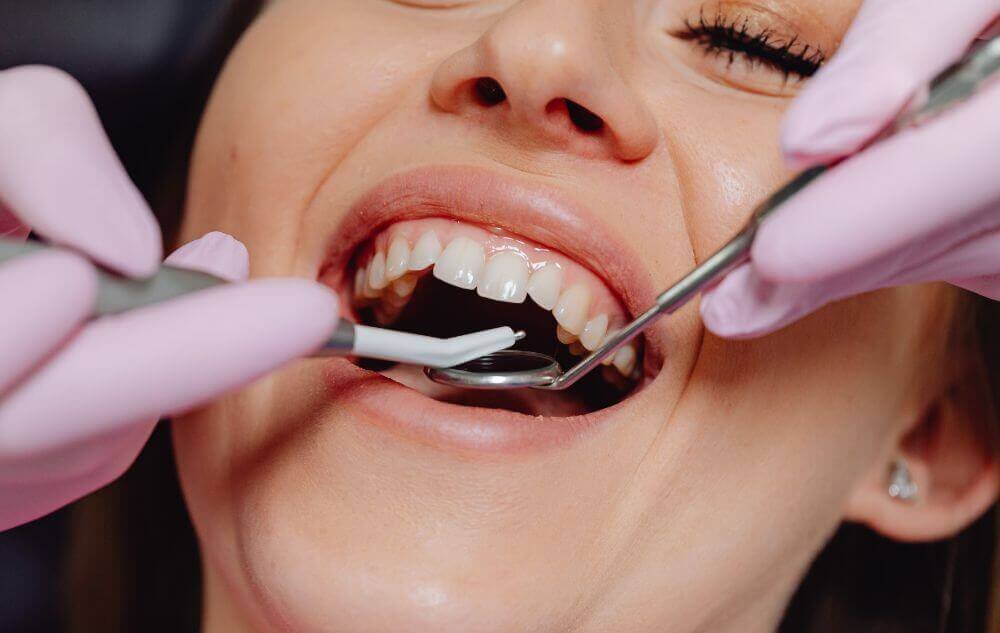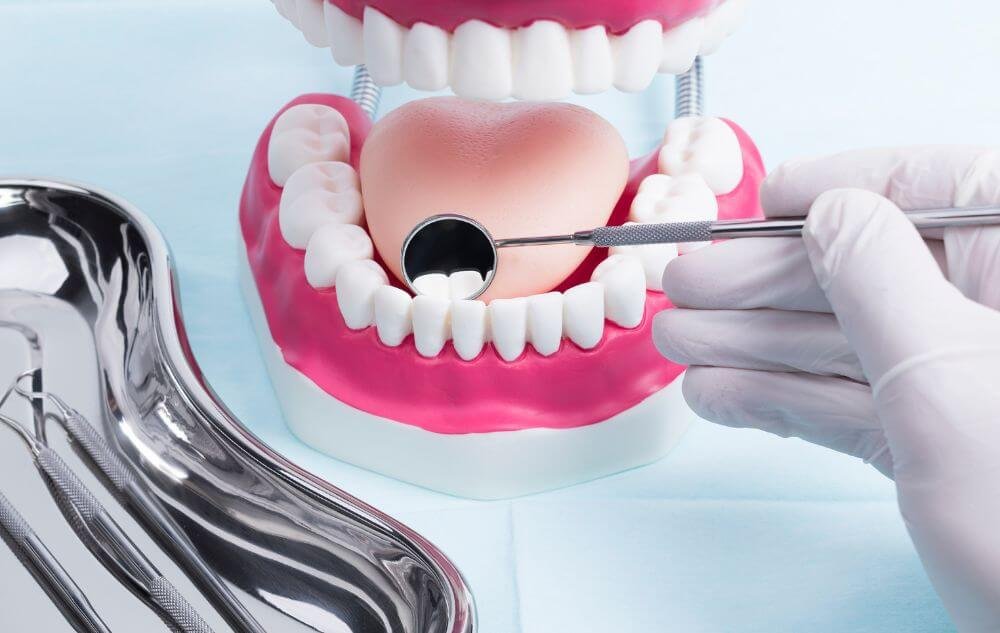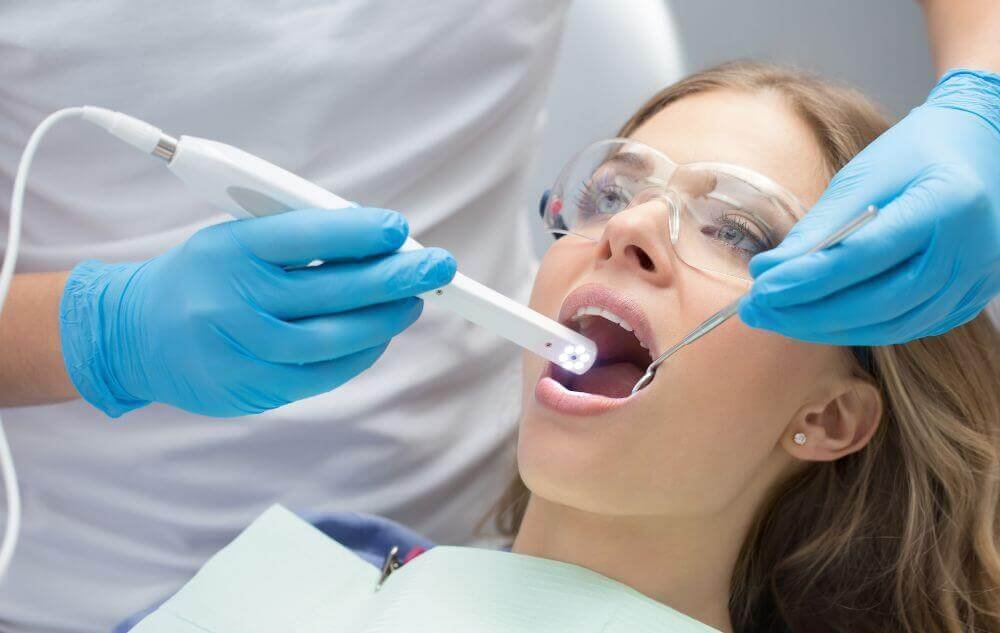General Dentistry
- Home
- General Dentistry
Unlock Your Best Smile with General Dentistry Services
At Camellia Polyclinic, Dr. Racha Farhat and her team are dedicated to providing comprehensive general dentistry services to help you achieve and maintain optimal oral health. From restorative treatments to root canal therapy, endodontic treatment for TMJ disorders and occlusion problems, to dental hygiene for all ages, we’ve got you covered.
Restorative Dentistry Treatments
Comprehensive Solutions for Your Dental Needs
Composite resin fillings are made of plastic and glass compounds, which can be color-matched to the tooth being restored, giving it an aesthetic advantage over the silver color of amalgam. Newer formulations of these materials have improved their capacity to withstand stress and wear.
Resin composites also bond to the patient’s tooth quickly. Most experts agree that composite restorations last from five to seven years.
Endodontic Therapy for Optimal Oral Health
Effective Root Canal Treatments in Beirut
Root canal therapy is used to remove nerves from the pulp of a tooth. It is thought to be very painful but is a pain-relieving treatment. Root canal treatment is not painful and can save a tooth that might otherwise have to be eradicated.
Why it’s needed?
The infection at the center of a tooth (the root canal) is caused by bacteria that live in the mouth and invade the tooth.
This can happen following tooth decay, leaky fillings, or damage to teeth due to trauma, such as a fall.
Maintain Your Smile with Professional Dental Hygiene Services
Optimal Oral Health Starts with Regular Cleanings
Suppose your dental hygienist cleans your teeth every six months or so. In that case, you know that a routine professional cleaning involves scaling teeth and the gumline to remove plaque and tartar and polishing to remove stains and smooth the tooth’s surface. This is done to keep your teeth and gums healthy.
Follow these tips to keep your teeth and gums healthy: Brush your teeth twice a day with fluoride toothpaste. Clean between teeth regularly to remove plaque. Use dental floss or a special brush recommended by a dental professional. Or try a floss holder, floss threader, or water flosser.
TMJ Disorders and Occlusion Problems Solutions
Comprehensive Care for Jaw and Bite Issues
The temporomandibular joint (TMJ) is the hinge connecting the lower jaw to the skull. It allows the jaw to move up and down and side to side so we can talk, chew, and yawn. When this joint is not working correctly, it can cause various problems, including pain, clicking or popping sounds, and difficulty moving the jaw. There are many possible causes of TMJ disorders, including clenching or grinding your teeth (bruxism), arthritis, joint dislocation, and jaw trauma.
Treatment for TMJ disorders often includes self-care measures such as eating soft foods and avoiding chewing gum. You may also be prescribed medication to help relieve pain and inflammation. In some cases, surgery may be necessary. If you think you may have a TMJ disorder, it’s important to see your dentist or doctor so that they can properly diagnose you.
Wisdom Teeth Extraction Services in Beirut
Gentle and Effective Solutions for Impacted Teeth
Wisdom teeth — also called third molars — are the last teeth that grow in. They usually erupt (break through your gums) between the ages of 17 and 25. Sometimes, wisdom teeth erupt in alignment with your other teeth and don’t cause any problems. Other times, they become either partially or fully trapped in your gums or jawbone.
This is referred to as impaction. Impacted wisdom teeth can cause a variety of oral health problems, including cavities, gum disease, and infection. Surgical removal is often recommended as a treatment for impacted wisdom teeth.

Children's Dentist

General Dentistry

General Dentistry

Yearly Checkup
We are a Dental Clinic with Proven Results
Your Dental Questions Answered
Common Concerns and Solutions for Your Dental Needs
This section will explore some of the most asked questions regarding our general dentistry services. Book your appointment at Camellia Polyclinic in Beirut today and take the first step towards a healthier smile.
Discussing your health and medical history with your dentist can help pinpoint certain allergies that might pose a problem with anesthesia and some drugs. It can also ensure that your dentist can develop a customized treatment plan that best suits your conditions. Most importantly, general knowledge of your medical history can aid your dentist in taking the best approach possible in case of emergencies.
Halitosis, more commonly known as "bad breath," can vary in odors and intensity, depending on the source of the problem. It is caused by several reasons, such as the type of food consumed, oral hygiene, and underlying health conditions.
Bad breath is often caused by poor dental hygiene and habits. If you don't brush and floss your teeth regularly, food and bacteria will accumulate inside your mouth, around your gums, and on the tongue, leading to bad breath. Moreover, bad breath can be affected by the type of food you're consuming.
Also, many health problems are associated with bad breath, such as gum diseases, dry mouth, diabetes, poorly fitted denture or dental appliances, yeast infection of the oral cavity, and cavities. Smoking can also play a role in aggravating bad breath, teeth stains, and irritation to the gums.
Bad breath can be prevented or reduced by practicing good oral hygiene, such as brushing at least twice daily with fluoride toothpaste and flossing at night. Brushing the tongue can also play a major role in banishing bad breath, and using mouthwash daily can help kill the bacteria that cause this annoying problem. However, it's better to ask for your dentist's advice on which mouthwash or toothpaste to use. Moreover, drinking lots of water will help keep your mouth moist and help wash away food particles and bacteria. Keeping track of the food you eat is a helpful trick as well.
Last but not least, checking in with your dentist at least twice a year, i.e., once every six months, is essential to figure out an underlying health problem and how to solve it.
Scaling is a routine procedure that is done to remove tartar and plaque buildup from the tooth surface and from up and beneath the gum line.
In normal cases, healthy adults and children should have their teeth cleaned and polished once every six months. However, this doesn't apply to everyone. For instance, people with braces need to get scaling done every 3-4 months.
Also, people with periodontal problems should have several scaling sessions throughout the year, depending on the severity of the case.
Each dental treatment has its own indications and advantages. Crowns are usually ideal for situations where the dental damage is huge and considerable, whereas fillings are ideal when the damage is less significant and pronounced.
The tooth's condition can also play a major role in our selection. If the tooth material left behind is enough to sustain a filling, the filling would be enough to ensure durability and structure. However, if the leftover tooth is fragile or small, a crown will be needed to maintain structure. Nevertheless, undergoing an endodontic treatment would be a major indication for crowns because crowns can help protect the tooth after the nerve and pulp are removed.
Most people fully recover from wisdom teeth removal in one to two weeks. In most cases, you can return to work, school, and other everyday routines in just a few days.
Call Us
71 567 894


